Paris Peace Conference: Settlement of Colonial Issues
VerifiedAdded on 2023/01/19
|11
|2935
|27
AI Summary
This essay examines the factors that led to the development of the Paris Peace Conference and the settlement of colonial issues in 1919. It discusses the background, outcomes, and consequences of the conference, highlighting the importance of this event in shaping post-World War I history.
Contribute Materials
Your contribution can guide someone’s learning journey. Share your
documents today.
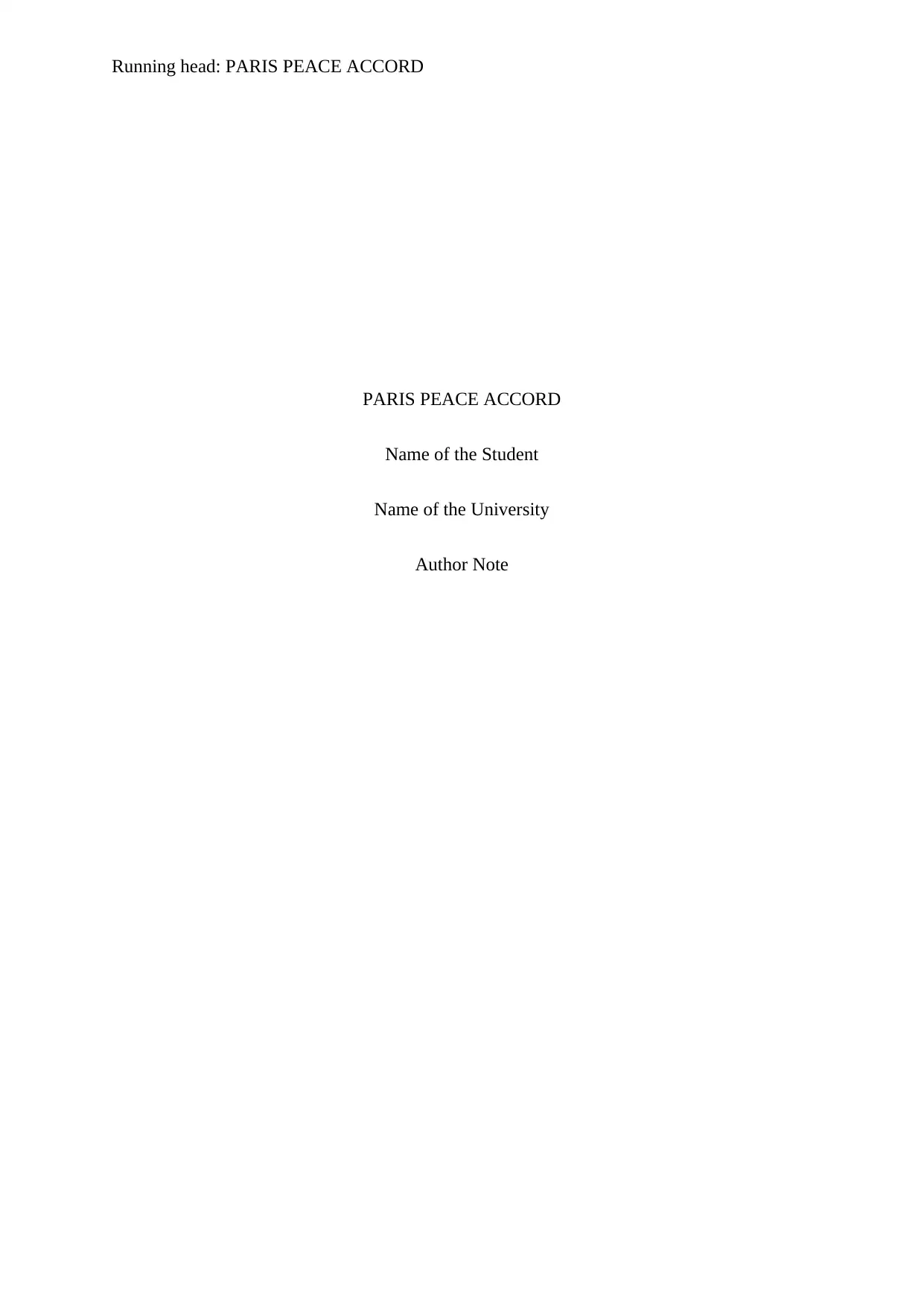
Running head: PARIS PEACE ACCORD
PARIS PEACE ACCORD
Name of the Student
Name of the University
Author Note
PARIS PEACE ACCORD
Name of the Student
Name of the University
Author Note
Secure Best Marks with AI Grader
Need help grading? Try our AI Grader for instant feedback on your assignments.
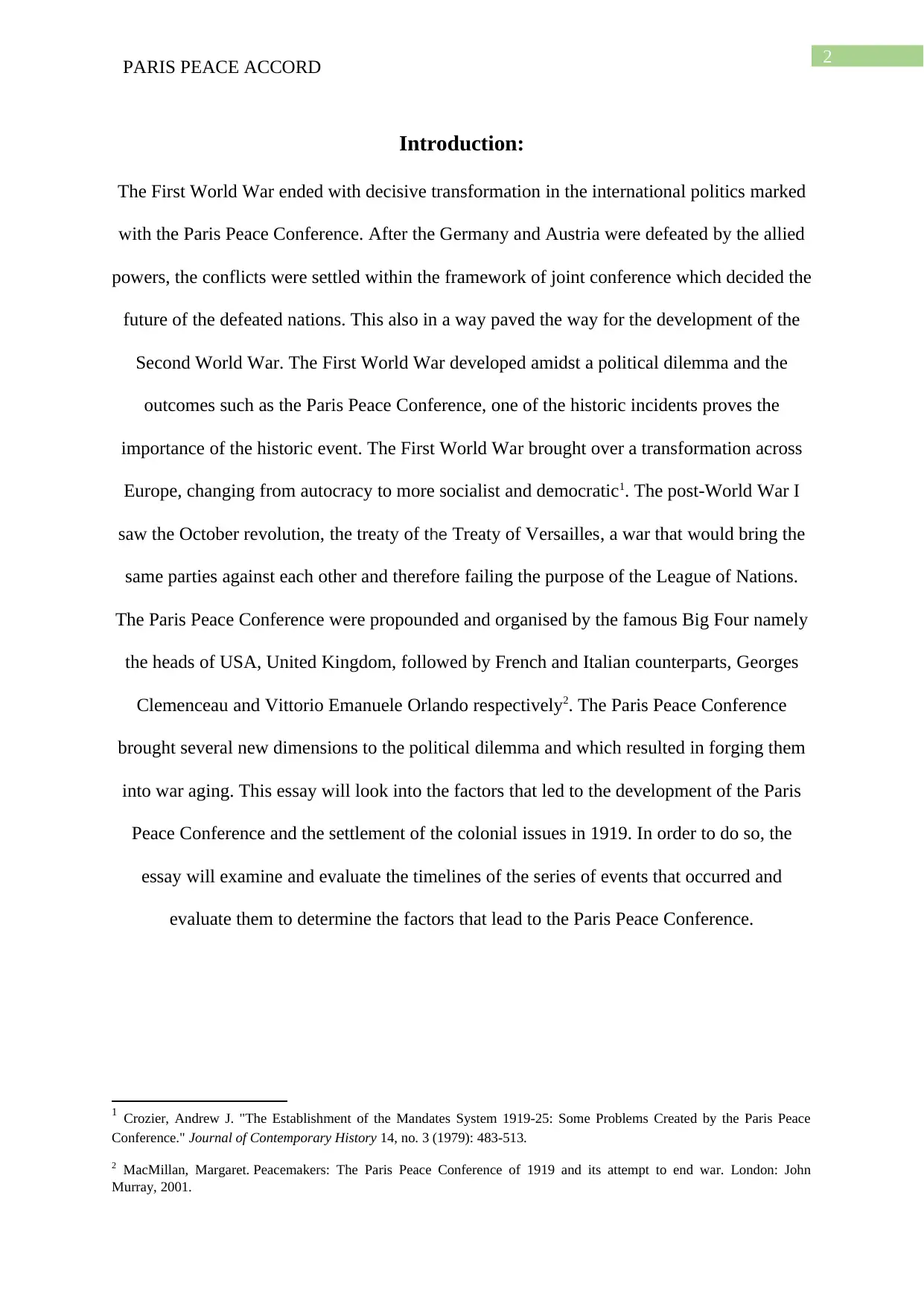
2
PARIS PEACE ACCORD
Introduction:
The First World War ended with decisive transformation in the international politics marked
with the Paris Peace Conference. After the Germany and Austria were defeated by the allied
powers, the conflicts were settled within the framework of joint conference which decided the
future of the defeated nations. This also in a way paved the way for the development of the
Second World War. The First World War developed amidst a political dilemma and the
outcomes such as the Paris Peace Conference, one of the historic incidents proves the
importance of the historic event. The First World War brought over a transformation across
Europe, changing from autocracy to more socialist and democratic1. The post-World War I
saw the October revolution, the treaty of the Treaty of Versailles, a war that would bring the
same parties against each other and therefore failing the purpose of the League of Nations.
The Paris Peace Conference were propounded and organised by the famous Big Four namely
the heads of USA, United Kingdom, followed by French and Italian counterparts, Georges
Clemenceau and Vittorio Emanuele Orlando respectively2. The Paris Peace Conference
brought several new dimensions to the political dilemma and which resulted in forging them
into war aging. This essay will look into the factors that led to the development of the Paris
Peace Conference and the settlement of the colonial issues in 1919. In order to do so, the
essay will examine and evaluate the timelines of the series of events that occurred and
evaluate them to determine the factors that lead to the Paris Peace Conference.
1 Crozier, Andrew J. "The Establishment of the Mandates System 1919-25: Some Problems Created by the Paris Peace
Conference." Journal of Contemporary History 14, no. 3 (1979): 483-513.
2 MacMillan, Margaret. Peacemakers: The Paris Peace Conference of 1919 and its attempt to end war. London: John
Murray, 2001.
PARIS PEACE ACCORD
Introduction:
The First World War ended with decisive transformation in the international politics marked
with the Paris Peace Conference. After the Germany and Austria were defeated by the allied
powers, the conflicts were settled within the framework of joint conference which decided the
future of the defeated nations. This also in a way paved the way for the development of the
Second World War. The First World War developed amidst a political dilemma and the
outcomes such as the Paris Peace Conference, one of the historic incidents proves the
importance of the historic event. The First World War brought over a transformation across
Europe, changing from autocracy to more socialist and democratic1. The post-World War I
saw the October revolution, the treaty of the Treaty of Versailles, a war that would bring the
same parties against each other and therefore failing the purpose of the League of Nations.
The Paris Peace Conference were propounded and organised by the famous Big Four namely
the heads of USA, United Kingdom, followed by French and Italian counterparts, Georges
Clemenceau and Vittorio Emanuele Orlando respectively2. The Paris Peace Conference
brought several new dimensions to the political dilemma and which resulted in forging them
into war aging. This essay will look into the factors that led to the development of the Paris
Peace Conference and the settlement of the colonial issues in 1919. In order to do so, the
essay will examine and evaluate the timelines of the series of events that occurred and
evaluate them to determine the factors that lead to the Paris Peace Conference.
1 Crozier, Andrew J. "The Establishment of the Mandates System 1919-25: Some Problems Created by the Paris Peace
Conference." Journal of Contemporary History 14, no. 3 (1979): 483-513.
2 MacMillan, Margaret. Peacemakers: The Paris Peace Conference of 1919 and its attempt to end war. London: John
Murray, 2001.
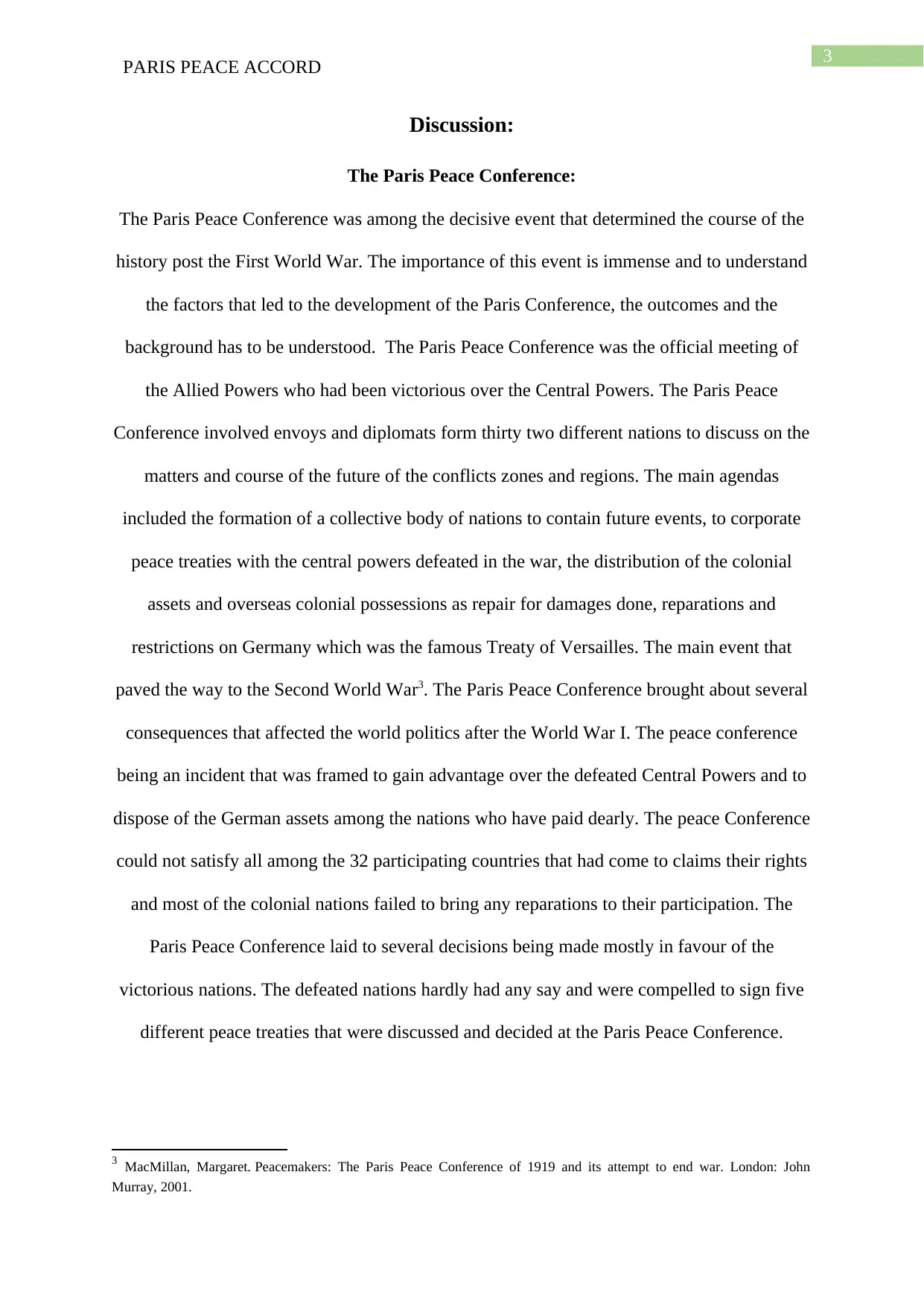
3
PARIS PEACE ACCORD
Discussion:
The Paris Peace Conference:
The Paris Peace Conference was among the decisive event that determined the course of the
history post the First World War. The importance of this event is immense and to understand
the factors that led to the development of the Paris Conference, the outcomes and the
background has to be understood. The Paris Peace Conference was the official meeting of
the Allied Powers who had been victorious over the Central Powers. The Paris Peace
Conference involved envoys and diplomats form thirty two different nations to discuss on the
matters and course of the future of the conflicts zones and regions. The main agendas
included the formation of a collective body of nations to contain future events, to corporate
peace treaties with the central powers defeated in the war, the distribution of the colonial
assets and overseas colonial possessions as repair for damages done, reparations and
restrictions on Germany which was the famous Treaty of Versailles. The main event that
paved the way to the Second World War3. The Paris Peace Conference brought about several
consequences that affected the world politics after the World War I. The peace conference
being an incident that was framed to gain advantage over the defeated Central Powers and to
dispose of the German assets among the nations who have paid dearly. The peace Conference
could not satisfy all among the 32 participating countries that had come to claims their rights
and most of the colonial nations failed to bring any reparations to their participation. The
Paris Peace Conference laid to several decisions being made mostly in favour of the
victorious nations. The defeated nations hardly had any say and were compelled to sign five
different peace treaties that were discussed and decided at the Paris Peace Conference.
3 MacMillan, Margaret. Peacemakers: The Paris Peace Conference of 1919 and its attempt to end war. London: John
Murray, 2001.
PARIS PEACE ACCORD
Discussion:
The Paris Peace Conference:
The Paris Peace Conference was among the decisive event that determined the course of the
history post the First World War. The importance of this event is immense and to understand
the factors that led to the development of the Paris Conference, the outcomes and the
background has to be understood. The Paris Peace Conference was the official meeting of
the Allied Powers who had been victorious over the Central Powers. The Paris Peace
Conference involved envoys and diplomats form thirty two different nations to discuss on the
matters and course of the future of the conflicts zones and regions. The main agendas
included the formation of a collective body of nations to contain future events, to corporate
peace treaties with the central powers defeated in the war, the distribution of the colonial
assets and overseas colonial possessions as repair for damages done, reparations and
restrictions on Germany which was the famous Treaty of Versailles. The main event that
paved the way to the Second World War3. The Paris Peace Conference brought about several
consequences that affected the world politics after the World War I. The peace conference
being an incident that was framed to gain advantage over the defeated Central Powers and to
dispose of the German assets among the nations who have paid dearly. The peace Conference
could not satisfy all among the 32 participating countries that had come to claims their rights
and most of the colonial nations failed to bring any reparations to their participation. The
Paris Peace Conference laid to several decisions being made mostly in favour of the
victorious nations. The defeated nations hardly had any say and were compelled to sign five
different peace treaties that were discussed and decided at the Paris Peace Conference.
3 MacMillan, Margaret. Peacemakers: The Paris Peace Conference of 1919 and its attempt to end war. London: John
Murray, 2001.
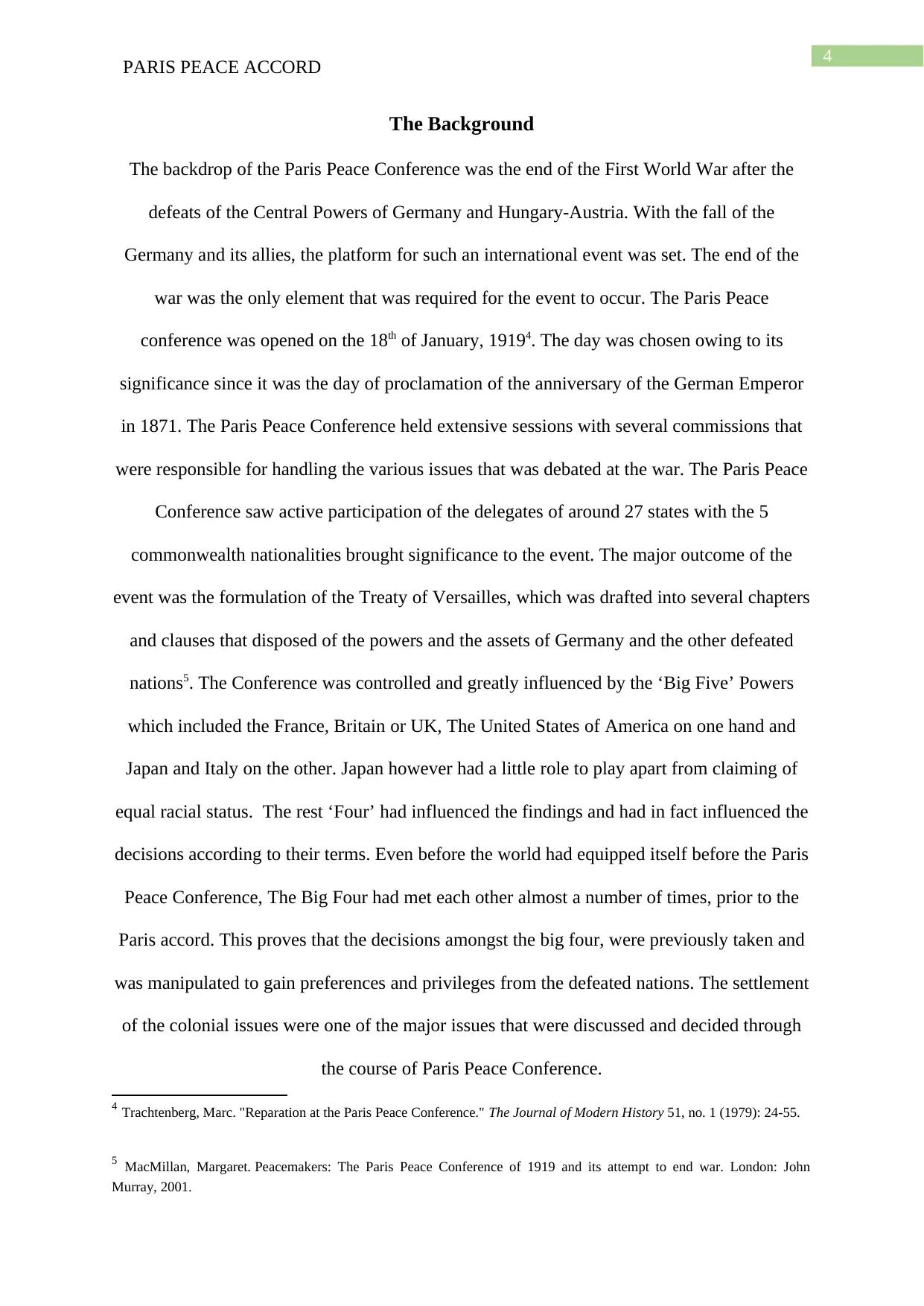
4
PARIS PEACE ACCORD
The Background
The backdrop of the Paris Peace Conference was the end of the First World War after the
defeats of the Central Powers of Germany and Hungary-Austria. With the fall of the
Germany and its allies, the platform for such an international event was set. The end of the
war was the only element that was required for the event to occur. The Paris Peace
conference was opened on the 18th of January, 19194. The day was chosen owing to its
significance since it was the day of proclamation of the anniversary of the German Emperor
in 1871. The Paris Peace Conference held extensive sessions with several commissions that
were responsible for handling the various issues that was debated at the war. The Paris Peace
Conference saw active participation of the delegates of around 27 states with the 5
commonwealth nationalities brought significance to the event. The major outcome of the
event was the formulation of the Treaty of Versailles, which was drafted into several chapters
and clauses that disposed of the powers and the assets of Germany and the other defeated
nations5. The Conference was controlled and greatly influenced by the ‘Big Five’ Powers
which included the France, Britain or UK, The United States of America on one hand and
Japan and Italy on the other. Japan however had a little role to play apart from claiming of
equal racial status. The rest ‘Four’ had influenced the findings and had in fact influenced the
decisions according to their terms. Even before the world had equipped itself before the Paris
Peace Conference, The Big Four had met each other almost a number of times, prior to the
Paris accord. This proves that the decisions amongst the big four, were previously taken and
was manipulated to gain preferences and privileges from the defeated nations. The settlement
of the colonial issues were one of the major issues that were discussed and decided through
the course of Paris Peace Conference.
4 Trachtenberg, Marc. "Reparation at the Paris Peace Conference." The Journal of Modern History 51, no. 1 (1979): 24-55.
5 MacMillan, Margaret. Peacemakers: The Paris Peace Conference of 1919 and its attempt to end war. London: John
Murray, 2001.
PARIS PEACE ACCORD
The Background
The backdrop of the Paris Peace Conference was the end of the First World War after the
defeats of the Central Powers of Germany and Hungary-Austria. With the fall of the
Germany and its allies, the platform for such an international event was set. The end of the
war was the only element that was required for the event to occur. The Paris Peace
conference was opened on the 18th of January, 19194. The day was chosen owing to its
significance since it was the day of proclamation of the anniversary of the German Emperor
in 1871. The Paris Peace Conference held extensive sessions with several commissions that
were responsible for handling the various issues that was debated at the war. The Paris Peace
Conference saw active participation of the delegates of around 27 states with the 5
commonwealth nationalities brought significance to the event. The major outcome of the
event was the formulation of the Treaty of Versailles, which was drafted into several chapters
and clauses that disposed of the powers and the assets of Germany and the other defeated
nations5. The Conference was controlled and greatly influenced by the ‘Big Five’ Powers
which included the France, Britain or UK, The United States of America on one hand and
Japan and Italy on the other. Japan however had a little role to play apart from claiming of
equal racial status. The rest ‘Four’ had influenced the findings and had in fact influenced the
decisions according to their terms. Even before the world had equipped itself before the Paris
Peace Conference, The Big Four had met each other almost a number of times, prior to the
Paris accord. This proves that the decisions amongst the big four, were previously taken and
was manipulated to gain preferences and privileges from the defeated nations. The settlement
of the colonial issues were one of the major issues that were discussed and decided through
the course of Paris Peace Conference.
4 Trachtenberg, Marc. "Reparation at the Paris Peace Conference." The Journal of Modern History 51, no. 1 (1979): 24-55.
5 MacMillan, Margaret. Peacemakers: The Paris Peace Conference of 1919 and its attempt to end war. London: John
Murray, 2001.
Secure Best Marks with AI Grader
Need help grading? Try our AI Grader for instant feedback on your assignments.
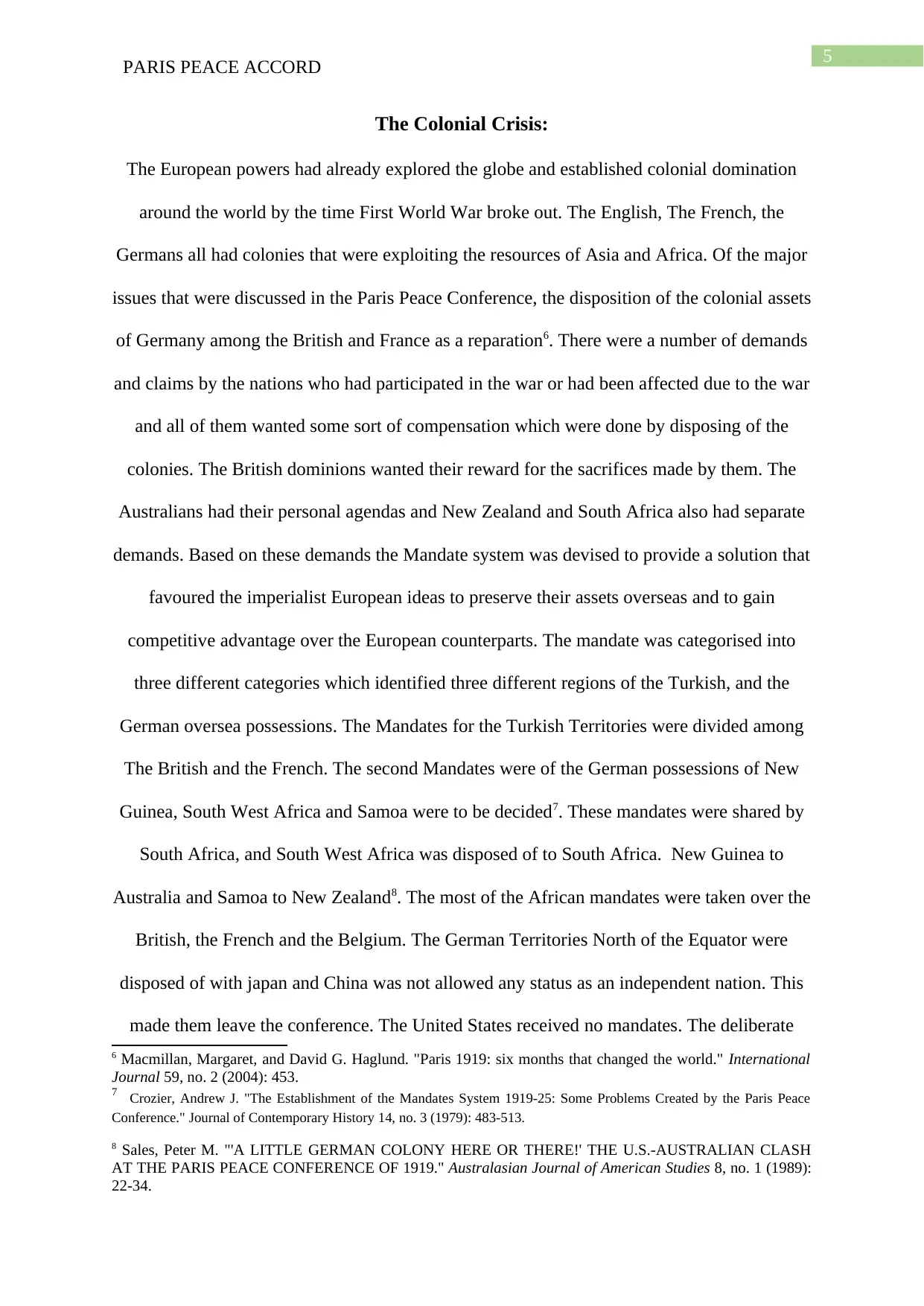
5
PARIS PEACE ACCORD
The Colonial Crisis:
The European powers had already explored the globe and established colonial domination
around the world by the time First World War broke out. The English, The French, the
Germans all had colonies that were exploiting the resources of Asia and Africa. Of the major
issues that were discussed in the Paris Peace Conference, the disposition of the colonial assets
of Germany among the British and France as a reparation6. There were a number of demands
and claims by the nations who had participated in the war or had been affected due to the war
and all of them wanted some sort of compensation which were done by disposing of the
colonies. The British dominions wanted their reward for the sacrifices made by them. The
Australians had their personal agendas and New Zealand and South Africa also had separate
demands. Based on these demands the Mandate system was devised to provide a solution that
favoured the imperialist European ideas to preserve their assets overseas and to gain
competitive advantage over the European counterparts. The mandate was categorised into
three different categories which identified three different regions of the Turkish, and the
German oversea possessions. The Mandates for the Turkish Territories were divided among
The British and the French. The second Mandates were of the German possessions of New
Guinea, South West Africa and Samoa were to be decided7. These mandates were shared by
South Africa, and South West Africa was disposed of to South Africa. New Guinea to
Australia and Samoa to New Zealand8. The most of the African mandates were taken over the
British, the French and the Belgium. The German Territories North of the Equator were
disposed of with japan and China was not allowed any status as an independent nation. This
made them leave the conference. The United States received no mandates. The deliberate
6 Macmillan, Margaret, and David G. Haglund. "Paris 1919: six months that changed the world." International
Journal 59, no. 2 (2004): 453.
7 Crozier, Andrew J. "The Establishment of the Mandates System 1919-25: Some Problems Created by the Paris Peace
Conference." Journal of Contemporary History 14, no. 3 (1979): 483-513.
8 Sales, Peter M. "'A LITTLE GERMAN COLONY HERE OR THERE!' THE U.S.-AUSTRALIAN CLASH
AT THE PARIS PEACE CONFERENCE OF 1919." Australasian Journal of American Studies 8, no. 1 (1989):
22-34.
PARIS PEACE ACCORD
The Colonial Crisis:
The European powers had already explored the globe and established colonial domination
around the world by the time First World War broke out. The English, The French, the
Germans all had colonies that were exploiting the resources of Asia and Africa. Of the major
issues that were discussed in the Paris Peace Conference, the disposition of the colonial assets
of Germany among the British and France as a reparation6. There were a number of demands
and claims by the nations who had participated in the war or had been affected due to the war
and all of them wanted some sort of compensation which were done by disposing of the
colonies. The British dominions wanted their reward for the sacrifices made by them. The
Australians had their personal agendas and New Zealand and South Africa also had separate
demands. Based on these demands the Mandate system was devised to provide a solution that
favoured the imperialist European ideas to preserve their assets overseas and to gain
competitive advantage over the European counterparts. The mandate was categorised into
three different categories which identified three different regions of the Turkish, and the
German oversea possessions. The Mandates for the Turkish Territories were divided among
The British and the French. The second Mandates were of the German possessions of New
Guinea, South West Africa and Samoa were to be decided7. These mandates were shared by
South Africa, and South West Africa was disposed of to South Africa. New Guinea to
Australia and Samoa to New Zealand8. The most of the African mandates were taken over the
British, the French and the Belgium. The German Territories North of the Equator were
disposed of with japan and China was not allowed any status as an independent nation. This
made them leave the conference. The United States received no mandates. The deliberate
6 Macmillan, Margaret, and David G. Haglund. "Paris 1919: six months that changed the world." International
Journal 59, no. 2 (2004): 453.
7 Crozier, Andrew J. "The Establishment of the Mandates System 1919-25: Some Problems Created by the Paris Peace
Conference." Journal of Contemporary History 14, no. 3 (1979): 483-513.
8 Sales, Peter M. "'A LITTLE GERMAN COLONY HERE OR THERE!' THE U.S.-AUSTRALIAN CLASH
AT THE PARIS PEACE CONFERENCE OF 1919." Australasian Journal of American Studies 8, no. 1 (1989):
22-34.
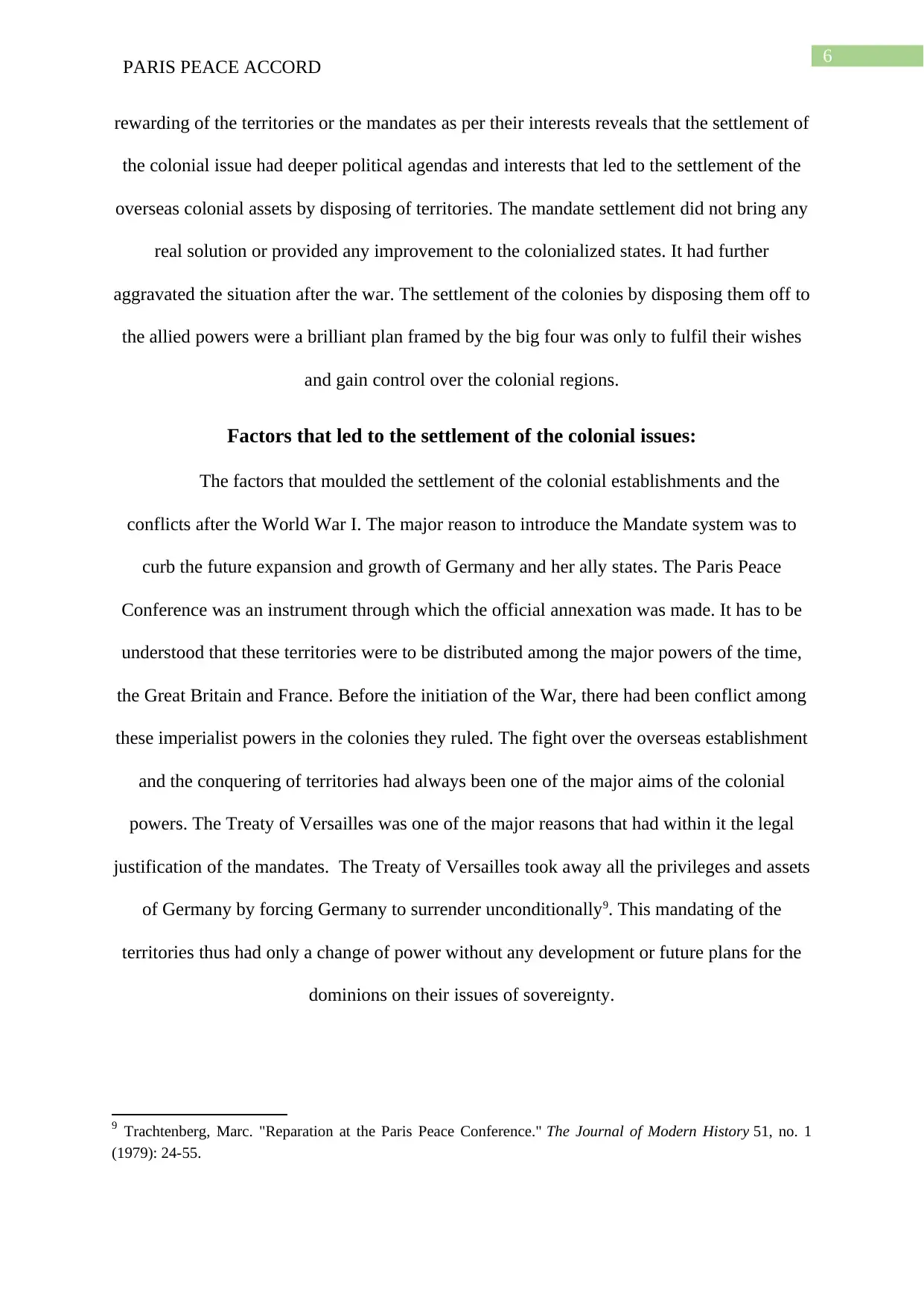
6
PARIS PEACE ACCORD
rewarding of the territories or the mandates as per their interests reveals that the settlement of
the colonial issue had deeper political agendas and interests that led to the settlement of the
overseas colonial assets by disposing of territories. The mandate settlement did not bring any
real solution or provided any improvement to the colonialized states. It had further
aggravated the situation after the war. The settlement of the colonies by disposing them off to
the allied powers were a brilliant plan framed by the big four was only to fulfil their wishes
and gain control over the colonial regions.
Factors that led to the settlement of the colonial issues:
The factors that moulded the settlement of the colonial establishments and the
conflicts after the World War I. The major reason to introduce the Mandate system was to
curb the future expansion and growth of Germany and her ally states. The Paris Peace
Conference was an instrument through which the official annexation was made. It has to be
understood that these territories were to be distributed among the major powers of the time,
the Great Britain and France. Before the initiation of the War, there had been conflict among
these imperialist powers in the colonies they ruled. The fight over the overseas establishment
and the conquering of territories had always been one of the major aims of the colonial
powers. The Treaty of Versailles was one of the major reasons that had within it the legal
justification of the mandates. The Treaty of Versailles took away all the privileges and assets
of Germany by forcing Germany to surrender unconditionally9. This mandating of the
territories thus had only a change of power without any development or future plans for the
dominions on their issues of sovereignty.
9 Trachtenberg, Marc. "Reparation at the Paris Peace Conference." The Journal of Modern History 51, no. 1
(1979): 24-55.
PARIS PEACE ACCORD
rewarding of the territories or the mandates as per their interests reveals that the settlement of
the colonial issue had deeper political agendas and interests that led to the settlement of the
overseas colonial assets by disposing of territories. The mandate settlement did not bring any
real solution or provided any improvement to the colonialized states. It had further
aggravated the situation after the war. The settlement of the colonies by disposing them off to
the allied powers were a brilliant plan framed by the big four was only to fulfil their wishes
and gain control over the colonial regions.
Factors that led to the settlement of the colonial issues:
The factors that moulded the settlement of the colonial establishments and the
conflicts after the World War I. The major reason to introduce the Mandate system was to
curb the future expansion and growth of Germany and her ally states. The Paris Peace
Conference was an instrument through which the official annexation was made. It has to be
understood that these territories were to be distributed among the major powers of the time,
the Great Britain and France. Before the initiation of the War, there had been conflict among
these imperialist powers in the colonies they ruled. The fight over the overseas establishment
and the conquering of territories had always been one of the major aims of the colonial
powers. The Treaty of Versailles was one of the major reasons that had within it the legal
justification of the mandates. The Treaty of Versailles took away all the privileges and assets
of Germany by forcing Germany to surrender unconditionally9. This mandating of the
territories thus had only a change of power without any development or future plans for the
dominions on their issues of sovereignty.
9 Trachtenberg, Marc. "Reparation at the Paris Peace Conference." The Journal of Modern History 51, no. 1
(1979): 24-55.
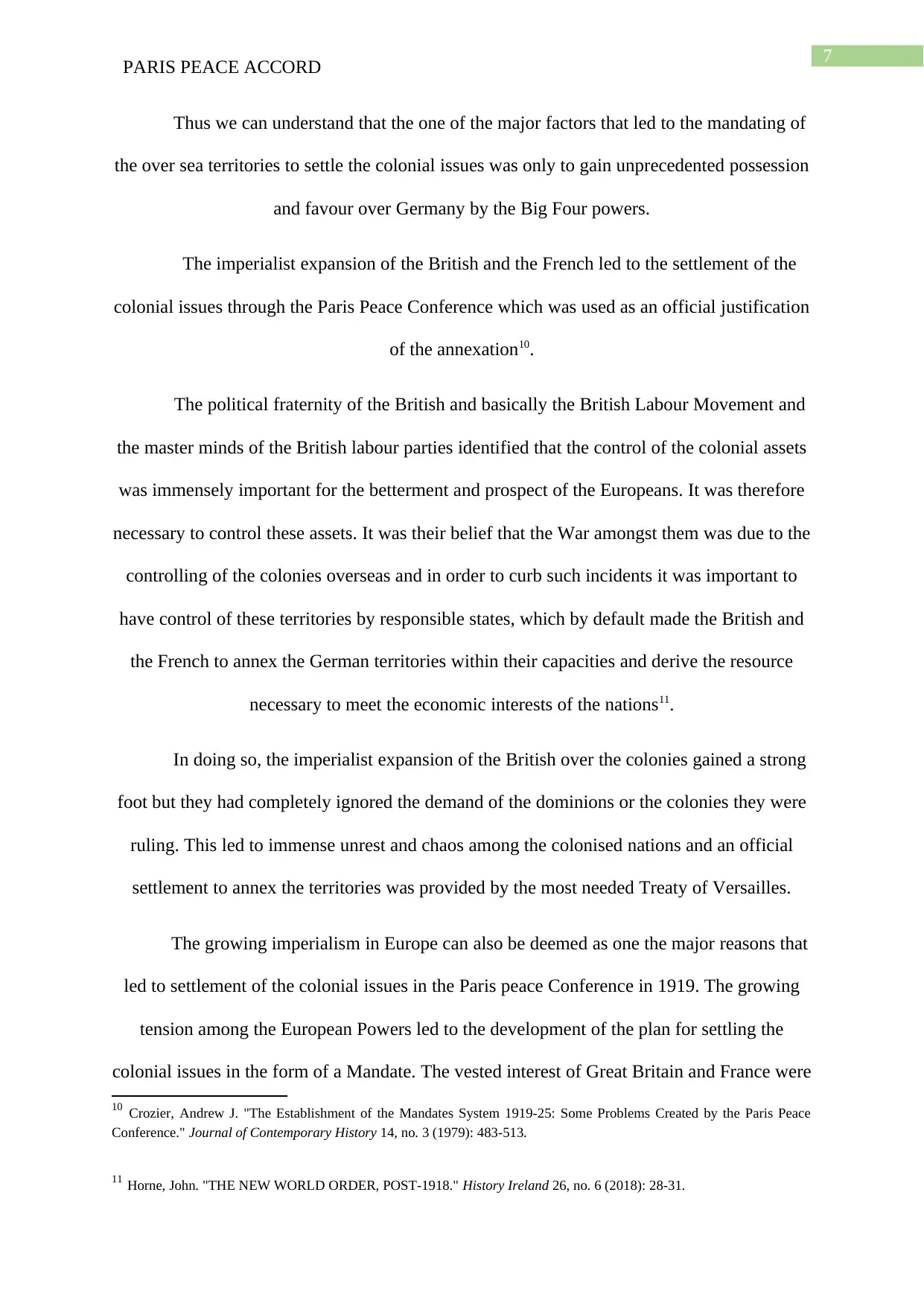
7
PARIS PEACE ACCORD
Thus we can understand that the one of the major factors that led to the mandating of
the over sea territories to settle the colonial issues was only to gain unprecedented possession
and favour over Germany by the Big Four powers.
The imperialist expansion of the British and the French led to the settlement of the
colonial issues through the Paris Peace Conference which was used as an official justification
of the annexation10.
The political fraternity of the British and basically the British Labour Movement and
the master minds of the British labour parties identified that the control of the colonial assets
was immensely important for the betterment and prospect of the Europeans. It was therefore
necessary to control these assets. It was their belief that the War amongst them was due to the
controlling of the colonies overseas and in order to curb such incidents it was important to
have control of these territories by responsible states, which by default made the British and
the French to annex the German territories within their capacities and derive the resource
necessary to meet the economic interests of the nations11.
In doing so, the imperialist expansion of the British over the colonies gained a strong
foot but they had completely ignored the demand of the dominions or the colonies they were
ruling. This led to immense unrest and chaos among the colonised nations and an official
settlement to annex the territories was provided by the most needed Treaty of Versailles.
The growing imperialism in Europe can also be deemed as one the major reasons that
led to settlement of the colonial issues in the Paris peace Conference in 1919. The growing
tension among the European Powers led to the development of the plan for settling the
colonial issues in the form of a Mandate. The vested interest of Great Britain and France were
10 Crozier, Andrew J. "The Establishment of the Mandates System 1919-25: Some Problems Created by the Paris Peace
Conference." Journal of Contemporary History 14, no. 3 (1979): 483-513.
11 Horne, John. "THE NEW WORLD ORDER, POST-1918." History Ireland 26, no. 6 (2018): 28-31.
PARIS PEACE ACCORD
Thus we can understand that the one of the major factors that led to the mandating of
the over sea territories to settle the colonial issues was only to gain unprecedented possession
and favour over Germany by the Big Four powers.
The imperialist expansion of the British and the French led to the settlement of the
colonial issues through the Paris Peace Conference which was used as an official justification
of the annexation10.
The political fraternity of the British and basically the British Labour Movement and
the master minds of the British labour parties identified that the control of the colonial assets
was immensely important for the betterment and prospect of the Europeans. It was therefore
necessary to control these assets. It was their belief that the War amongst them was due to the
controlling of the colonies overseas and in order to curb such incidents it was important to
have control of these territories by responsible states, which by default made the British and
the French to annex the German territories within their capacities and derive the resource
necessary to meet the economic interests of the nations11.
In doing so, the imperialist expansion of the British over the colonies gained a strong
foot but they had completely ignored the demand of the dominions or the colonies they were
ruling. This led to immense unrest and chaos among the colonised nations and an official
settlement to annex the territories was provided by the most needed Treaty of Versailles.
The growing imperialism in Europe can also be deemed as one the major reasons that
led to settlement of the colonial issues in the Paris peace Conference in 1919. The growing
tension among the European Powers led to the development of the plan for settling the
colonial issues in the form of a Mandate. The vested interest of Great Britain and France were
10 Crozier, Andrew J. "The Establishment of the Mandates System 1919-25: Some Problems Created by the Paris Peace
Conference." Journal of Contemporary History 14, no. 3 (1979): 483-513.
11 Horne, John. "THE NEW WORLD ORDER, POST-1918." History Ireland 26, no. 6 (2018): 28-31.
Paraphrase This Document
Need a fresh take? Get an instant paraphrase of this document with our AI Paraphraser
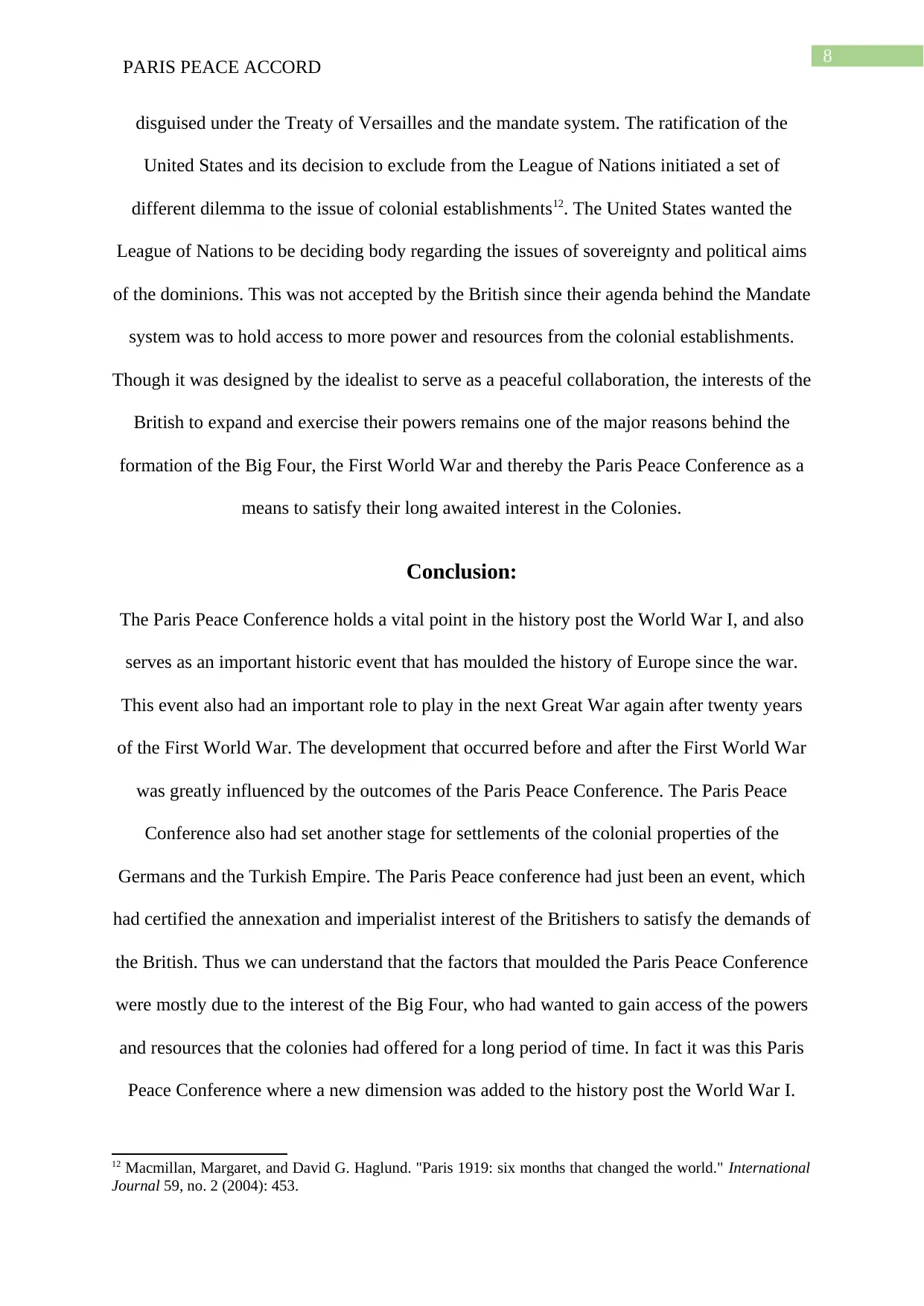
8
PARIS PEACE ACCORD
disguised under the Treaty of Versailles and the mandate system. The ratification of the
United States and its decision to exclude from the League of Nations initiated a set of
different dilemma to the issue of colonial establishments12. The United States wanted the
League of Nations to be deciding body regarding the issues of sovereignty and political aims
of the dominions. This was not accepted by the British since their agenda behind the Mandate
system was to hold access to more power and resources from the colonial establishments.
Though it was designed by the idealist to serve as a peaceful collaboration, the interests of the
British to expand and exercise their powers remains one of the major reasons behind the
formation of the Big Four, the First World War and thereby the Paris Peace Conference as a
means to satisfy their long awaited interest in the Colonies.
Conclusion:
The Paris Peace Conference holds a vital point in the history post the World War I, and also
serves as an important historic event that has moulded the history of Europe since the war.
This event also had an important role to play in the next Great War again after twenty years
of the First World War. The development that occurred before and after the First World War
was greatly influenced by the outcomes of the Paris Peace Conference. The Paris Peace
Conference also had set another stage for settlements of the colonial properties of the
Germans and the Turkish Empire. The Paris Peace conference had just been an event, which
had certified the annexation and imperialist interest of the Britishers to satisfy the demands of
the British. Thus we can understand that the factors that moulded the Paris Peace Conference
were mostly due to the interest of the Big Four, who had wanted to gain access of the powers
and resources that the colonies had offered for a long period of time. In fact it was this Paris
Peace Conference where a new dimension was added to the history post the World War I.
12 Macmillan, Margaret, and David G. Haglund. "Paris 1919: six months that changed the world." International
Journal 59, no. 2 (2004): 453.
PARIS PEACE ACCORD
disguised under the Treaty of Versailles and the mandate system. The ratification of the
United States and its decision to exclude from the League of Nations initiated a set of
different dilemma to the issue of colonial establishments12. The United States wanted the
League of Nations to be deciding body regarding the issues of sovereignty and political aims
of the dominions. This was not accepted by the British since their agenda behind the Mandate
system was to hold access to more power and resources from the colonial establishments.
Though it was designed by the idealist to serve as a peaceful collaboration, the interests of the
British to expand and exercise their powers remains one of the major reasons behind the
formation of the Big Four, the First World War and thereby the Paris Peace Conference as a
means to satisfy their long awaited interest in the Colonies.
Conclusion:
The Paris Peace Conference holds a vital point in the history post the World War I, and also
serves as an important historic event that has moulded the history of Europe since the war.
This event also had an important role to play in the next Great War again after twenty years
of the First World War. The development that occurred before and after the First World War
was greatly influenced by the outcomes of the Paris Peace Conference. The Paris Peace
Conference also had set another stage for settlements of the colonial properties of the
Germans and the Turkish Empire. The Paris Peace conference had just been an event, which
had certified the annexation and imperialist interest of the Britishers to satisfy the demands of
the British. Thus we can understand that the factors that moulded the Paris Peace Conference
were mostly due to the interest of the Big Four, who had wanted to gain access of the powers
and resources that the colonies had offered for a long period of time. In fact it was this Paris
Peace Conference where a new dimension was added to the history post the World War I.
12 Macmillan, Margaret, and David G. Haglund. "Paris 1919: six months that changed the world." International
Journal 59, no. 2 (2004): 453.

9
PARIS PEACE ACCORD
PARIS PEACE ACCORD
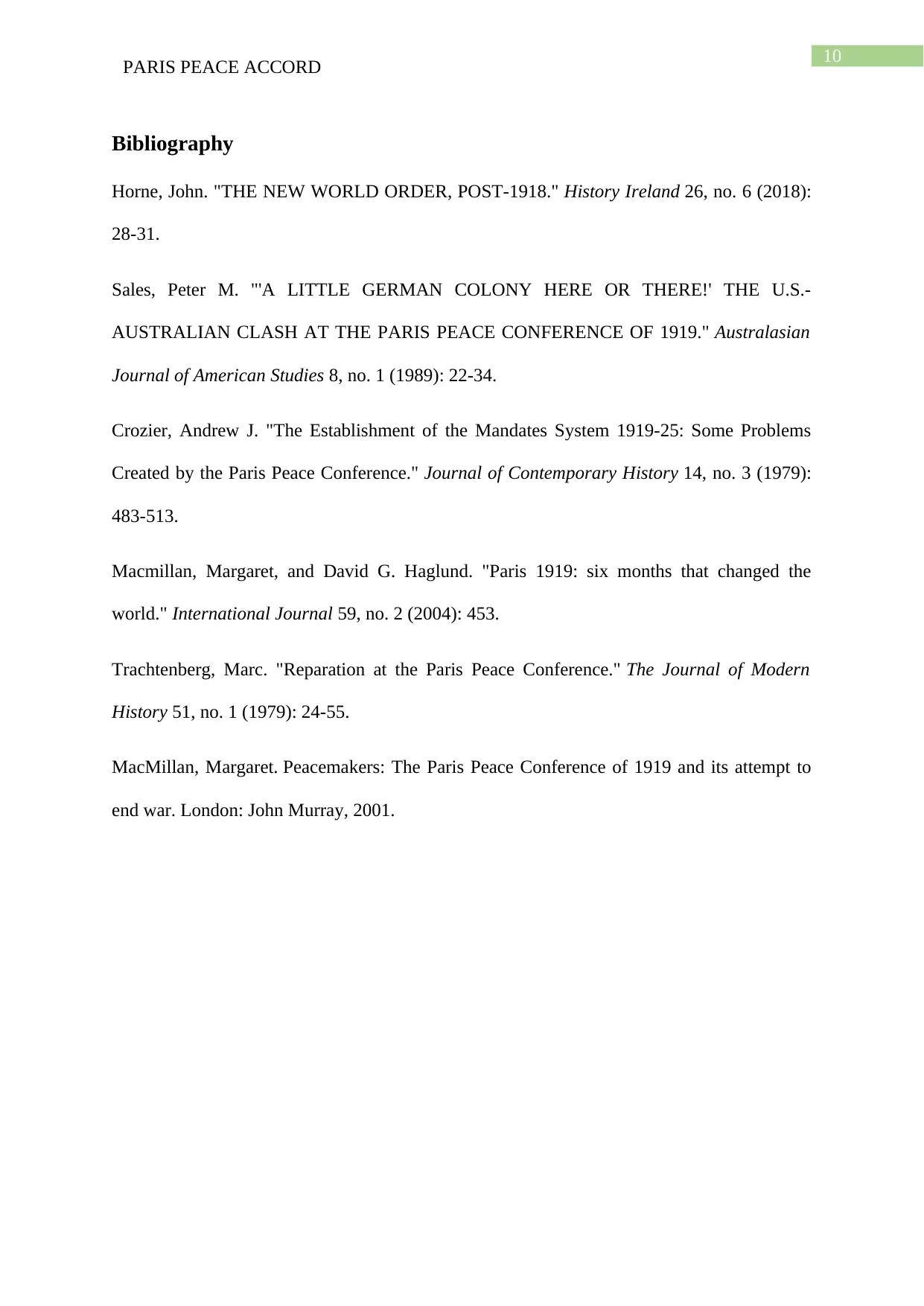
10
PARIS PEACE ACCORD
Bibliography
Horne, John. "THE NEW WORLD ORDER, POST-1918." History Ireland 26, no. 6 (2018):
28-31.
Sales, Peter M. "'A LITTLE GERMAN COLONY HERE OR THERE!' THE U.S.-
AUSTRALIAN CLASH AT THE PARIS PEACE CONFERENCE OF 1919." Australasian
Journal of American Studies 8, no. 1 (1989): 22-34.
Crozier, Andrew J. "The Establishment of the Mandates System 1919-25: Some Problems
Created by the Paris Peace Conference." Journal of Contemporary History 14, no. 3 (1979):
483-513.
Macmillan, Margaret, and David G. Haglund. "Paris 1919: six months that changed the
world." International Journal 59, no. 2 (2004): 453.
Trachtenberg, Marc. "Reparation at the Paris Peace Conference." The Journal of Modern
History 51, no. 1 (1979): 24-55.
MacMillan, Margaret. Peacemakers: The Paris Peace Conference of 1919 and its attempt to
end war. London: John Murray, 2001.
PARIS PEACE ACCORD
Bibliography
Horne, John. "THE NEW WORLD ORDER, POST-1918." History Ireland 26, no. 6 (2018):
28-31.
Sales, Peter M. "'A LITTLE GERMAN COLONY HERE OR THERE!' THE U.S.-
AUSTRALIAN CLASH AT THE PARIS PEACE CONFERENCE OF 1919." Australasian
Journal of American Studies 8, no. 1 (1989): 22-34.
Crozier, Andrew J. "The Establishment of the Mandates System 1919-25: Some Problems
Created by the Paris Peace Conference." Journal of Contemporary History 14, no. 3 (1979):
483-513.
Macmillan, Margaret, and David G. Haglund. "Paris 1919: six months that changed the
world." International Journal 59, no. 2 (2004): 453.
Trachtenberg, Marc. "Reparation at the Paris Peace Conference." The Journal of Modern
History 51, no. 1 (1979): 24-55.
MacMillan, Margaret. Peacemakers: The Paris Peace Conference of 1919 and its attempt to
end war. London: John Murray, 2001.
Secure Best Marks with AI Grader
Need help grading? Try our AI Grader for instant feedback on your assignments.

11
PARIS PEACE ACCORD
PARIS PEACE ACCORD
1 out of 11
Related Documents
Your All-in-One AI-Powered Toolkit for Academic Success.
+13062052269
info@desklib.com
Available 24*7 on WhatsApp / Email
![[object Object]](/_next/static/media/star-bottom.7253800d.svg)
Unlock your academic potential
© 2024 | Zucol Services PVT LTD | All rights reserved.





